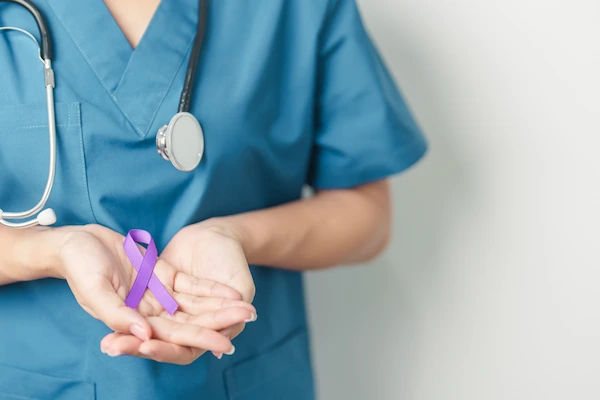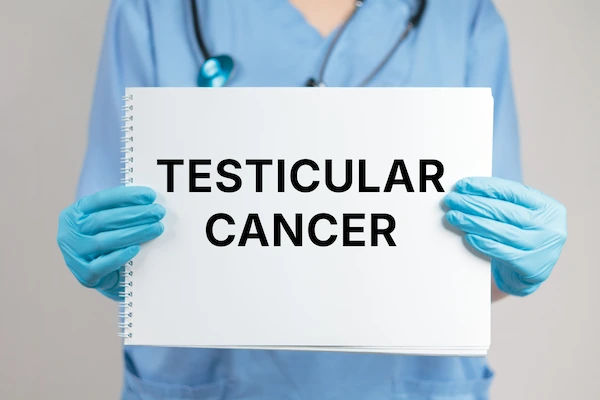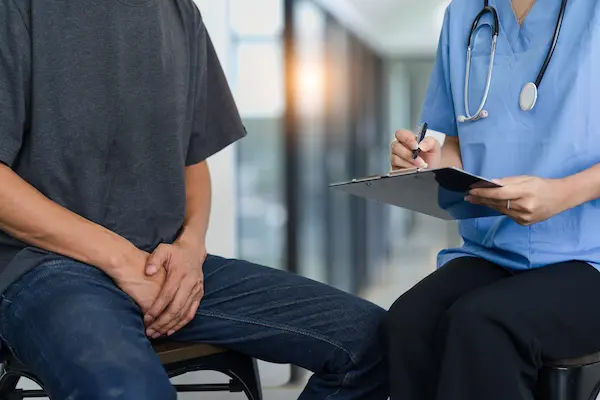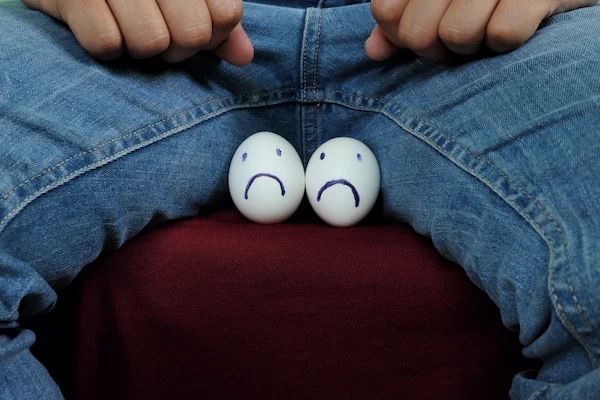Guide to Testicular Cancer: Symptoms, Treatment & Hope for Men
Learn about testicular cancer, including symptoms, risk factors, self-exams, diagnosis, and treatment options. Discover why it is highly curable and how men can find hope and thrive after recovery.

Written by Dr. Mohammed Kamran
Reviewed by Dr. Rohinipriyanka Pondugula MBBS
Last updated on 13th Jan, 2026

Introduction
Testicular cancer is a topic many men shy away from, but it’s one of the most important health conversations they can have. While it's a relatively rare cancer, it's the most common malignancy in men aged 15 to 35. The most crucial thing to know is this: testicular cancer is one of the most curable forms of cancer, especially when caught early. With survival rates exceeding 95%, knowledge and early action are your greatest weapons. This guide will walk you through everything you need to know—from identifying the early signs and performing a self-exam to understanding treatment options and thriving after recovery. Our goal is to empower you with information, reduce fear, and emphasise the profound hope that exists for anyone facing this diagnosis.
What is Testicular Cancer? A Basic Overview
Testicular cancer occurs when healthy cells in one or both testicles undergo malignant (cancerous) changes, growing uncontrollably and forming a tumour. The testicles, housed in the scrotum, are male reproductive glands responsible for producing sperm and the hormone testosterone.
Understanding the Testicles and Their Function
The testicles are made up of several types of cells, but more than 90% of testicular cancers begin in the germ cells—the cells that produce sperm. This is why they are often called germ cell tumours. The two main types of germ cell tumours are seminomas and non-seminomas, which grow and spread differently and are treated in distinct ways.
How Cancer Develops in the Testicles
The exact trigger for testicular cancer is unknown. It often begins when germ cells develop genetic mutations, causing them to multiply rapidly and resist the natural signals that tell cells to die. This accumulation of abnormal cells forms a mass or tumour. Unlike many cancers, testicular cancer has very few known environmental or lifestyle risk factors.
Consult a Urologist for the best advice
Know the Signs: Early Symptoms of Testicular Cancer
Early detection is straightforward because the symptoms are physical and often noticeable. The most common sign is a lump, but other changes can also occur.
The Most Common Symptom: A Lump or Swelling
The hallmark sign is a painless lump or swelling in either testicle. You may notice a change in size or a firmness that wasn't there before. It's important to remember that not all lumps are cancer, but every lump deserves a doctor's evaluation.
Other Physical Changes and Sensations
A feeling of heaviness or aching in the lower abdomen or scrotum.
A sudden collection of fluid in the scrotum.
Pain or a dull ache in the testicle or scrotum (though pain is not always present).
Changes in how the testicle feels or a noticeable difference between one testicle and the other.
Symptoms of Advanced Testicular Cancer
If the cancer has spread (metastasized), symptoms can include:
Dull back pain (indicating spread to lymph nodes).
Shortness of breath or chest pain (indicating spread to the lungs).
Swollen lymph nodes, particularly in the neck.
If you notice any of these symptoms, especially a persistent lump or swelling, consult a doctor online with Apollo24|7 for further evaluation. Early consultation is critical.
Am I at Risk? Understanding Testicular Cancer Risk Factors
Anyone with testicles can develop testicular cancer, but certain factors increase the risk.
The Primary Risk Factor: Cryptorchidism (Undescended Testicle)
This is the most significant risk factor. A male born with a testicle that hasn't moved down into the scrotum before birth has a higher risk, even if the condition was surgically corrected as an infant.
Family History and Genetic Predisposition
Having a close relative (like a father or brother) who has had testicular cancer increases your risk, suggesting a possible genetic link.
Age, Race, and Other Contributing Factors
Age: While it can occur at any age, it predominantly affects teens and young men (15-35 years old).
Race: White men have a significantly higher risk than Black or Asian men.
Personal History: A man who has had cancer in one testicle has an increased risk of developing it in the other.
Taking Action: How to Perform a Testicular Self-Exam
Monthly self-exams are the best way to familiarise yourself with what's normal for you and to catch changes early. The best time is during or after a warm shower or bath, when the scrotal skin is relaxed.
A Step-by-Step Guide to a Proper Exam
Stand in front of a mirror. Look for any swelling on the skin of the scrotum.
Examine each testicle separately. Gently roll the testicle between your thumbs and fingers of both hands.
Find the epididymis, the soft, rope-like structure at the back of the testicle that collects sperm. This is a normal lump, not a cause for alarm.
Feel for any hard lumps, smooth rounded masses, or any change in the size, shape, or consistency of your testicles.
What a Normal Testicle Feels Like
They should feel smooth and firm, but not rock-hard. It's common for one testicle to be slightly larger or hang lower than the other.
What to Look and Feel For During the Exam
Be on the lookout for any pea-sized or larger lumps, areas of hardness, or a general enlargement of the testicle. If you find something concerning, don't panic. Most lumps are not cancer, but it is essential to get it checked promptly.
Facing the Diagnosis: Tests and Procedures
If a doctor suspects testicular cancer, they will follow a standard set of diagnostic procedures.
The First Step: Physical Exam and Medical History
The doctor will feel your testicles for lumps, swelling, or tenderness and ask about your symptoms and risk factors.
Ultrasound: The Key Diagnostic Imaging Tool
This is the most important test. An ultrasound uses sound waves to create an image of the scrotum and testicles. It can confirm the presence, size, and location of a mass and determine whether it is solid (likely cancerous) or filled with fluid (a cyst).
Serum Tumour Marker Tests (Blood Tests)
Many testicular cancers produce specific proteins (tumour markers) that can be detected in the blood. These tests measure levels of Alpha-fetoprotein (AFP), Human chorionic gonadotropin (HCG), and Lactate dehydrogenase (LDH). Elevated levels can suggest the presence of a specific type of germ cell tumour. Apollo24|7 offers convenient home collection for these crucial blood tests, making the diagnostic process smoother.
Radical Inguinal Orchiectomy: The Definitive Diagnostic Surgery
If cancer is strongly suspected, the entire affected testicle will be removed through an incision in the groin (not the scrotum). This procedure serves two purposes: it is the primary treatment and allows a pathologist to analyse the tumour to confirm the cancer type and stage.
Staging the Cancer: What Does It Mean?
Staging determines how far the cancer has spread and guides treatment decisions.
The TNM System Explained Simply
Doctors use the TNM system:
Tumour (T): The size and extent of the main tumour.
Node (N): Whether cancer has spread to nearby lymph nodes.
Metastasis (M): Whether cancer has spread to distant organs.
Stage I, II, and III Testicular Cancer
Stage I: Cancer is confined to the testicle.
Stage II: Cancer has spread to nearby lymph nodes in the abdomen.
Stage III: Cancer has spread to distant lymph nodes or organs like the lungs or liver.
Treatment Options: Highly Curable and Tailored
Treatment is extremely effective and is chosen based on the type and stage of cancer.
Surgery: Orchiectomy and Beyond
Surgery is the first-line treatment for nearly all cases.
Radical Inguinal Orchiectomy
This is the initial surgery to remove the primary tumour. For early-stage cancer, this may be the only treatment needed.
Retroperitoneal Lymph Node Dissection (RPLND)
This is a complex abdominal surgery to remove lymph nodes where the cancer is likely to spread. It can be a primary treatment or used after chemotherapy.
Radiation Therapy
This uses high-energy beams to kill cancer cells. It is particularly effective against seminomas, which are very sensitive to radiation.
Chemotherapy
This uses powerful drugs that travel through the bloodstream to kill cancer cells anywhere in the body. It is the standard treatment for cancer that has spread beyond the testicle (Stages II and III). Cisplatin-based chemotherapy regimens have been a monumental success story in curing advanced testicular cancer.
Survivorship and Follow-Up Care
After treatment, you will enter a long-term follow-up care plan involving regular physical exams, blood tests (tumour markers), and CT scans to ensure the cancer has not returned.
Life After Treatment: Fertility and Sexual Health
Treatments can affect fertility and hormone levels, but these challenges are manageable.
Preserving Fertility Before Treatment (Sperm Banking)
Chemotherapy and radiation can damage sperm production. Sperm banking (cryopreservation) before starting treatment is strongly recommended for men who may want children in the future.
Impact on Testosterone and Sexual Function
Removing one testicle rarely causes low testosterone or sexual problems, as the remaining testicle can usually compensate. However, some men may require testosterone replacement therapy. Sexual desire and the ability to have an erection are typically unaffected.
The Emotional Journey and Mental Health
A cancer diagnosis is emotionally taxing. Feelings of anxiety, depression, or fear of recurrence are common. Seeking support from therapists, support groups, or oncological psychologists is a sign of strength and a crucial part of holistic recovery.
Prevention and Awareness: What You Can Do
There is no sure way to prevent testicular cancer, but you are not powerless.
The Power of Monthly Self-Exams
The single most effective thing you can do is become familiar with your body through regular self-exams. This empowers you to find any changes at the earliest, most treatable stage.
Knowing Your Family and Personal History
Be aware of your risk factors. If you have a history of an undescended testicle or a family history of the disease, be extra vigilant and discuss it with your doctor.
Conclusion
The journey through a testicular cancer diagnosis can feel overwhelming, but it is a path walked with a tremendous amount of hope and scientific success. This cancer, once a death sentence, is now a testament to the power of modern medicine. The message is clear: know your body, act on changes without delay, and trust in the highly effective treatments available. Your health is in your hands—literally, through self-exams—and in the capable hands of medical professionals. There is every reason to face the future with confidence. If you have any concerns or notice a change, don't wait. Book a physical visit to a doctor with Apollo24|7 and get the peace of mind you deserve.
Consult a Urologist for the best advice
Consult a Urologist for the best advice

Dr Anupam Sharma
Urologist
18 Years • MBBS, MS(Gen Surgery), DNB (Urology)
Delhi
Apollo Hospitals Indraprastha, Delhi
(25+ Patients)

Dr. Sudhakar G V
Urologist
25 Years • MBBS, MS(Gen.Surgery), DNB Urology
Bengaluru
Apollo Clinic, JP nagar, Bengaluru

Dr. Kunal Kumar Mehar
Urologist
10 Years • Mbbs, Ms, Mch
Bengaluru
Apollo Medical Center, Marathahalli, Bengaluru

Dr. Pavan Kumar S K
Urologist
11 Years • MBBS, MS , Mch( Urology) DNB (Urology)
Bengaluru
Apollo Clinic, JP nagar, Bengaluru

Dr. Ramesh H
Urologist
16 Years • MBBS, MS , Mch( Urology)
Bengaluru
Apollo Clinic, JP nagar, Bengaluru
More articles from Testicular Cancer
Frequently Asked Questions
1. Can you live a normal life with one testicle?
Absolutely. The remaining testicle will almost always produce enough testosterone to maintain sex drive, erections, and masculine characteristics. It will also produce enough sperm for fertility in most cases.
2. Does testicular cancer treatment affect fertility?
Yes, chemotherapy and radiation can temporarily or permanently affect sperm production. This is why sperm banking before treatment is strongly encouraged for men who may want biological children later.
3. What is the survival rate for testicular cancer?
The survival rate is one of the highest for any cancer. The 5-year relative survival rate for localised testicular cancer is 99%. Even for cancer that has spread to distant parts of the body, the rate is still a very high 73%.
4. Will my insurance cover testicular cancer treatment?
In most countries, comprehensive health insurance plans cover the necessary diagnostics and treatments for cancer. It's important to check with your specific insurance provider to understand your coverage details.
5. Can testicular cancer come back?
While the chances are low, recurrence is possible, which is why lifelong follow-up care is essential. Most recurrences happen within the first two years after treatment, which is why follow-up is most frequent during that time.




